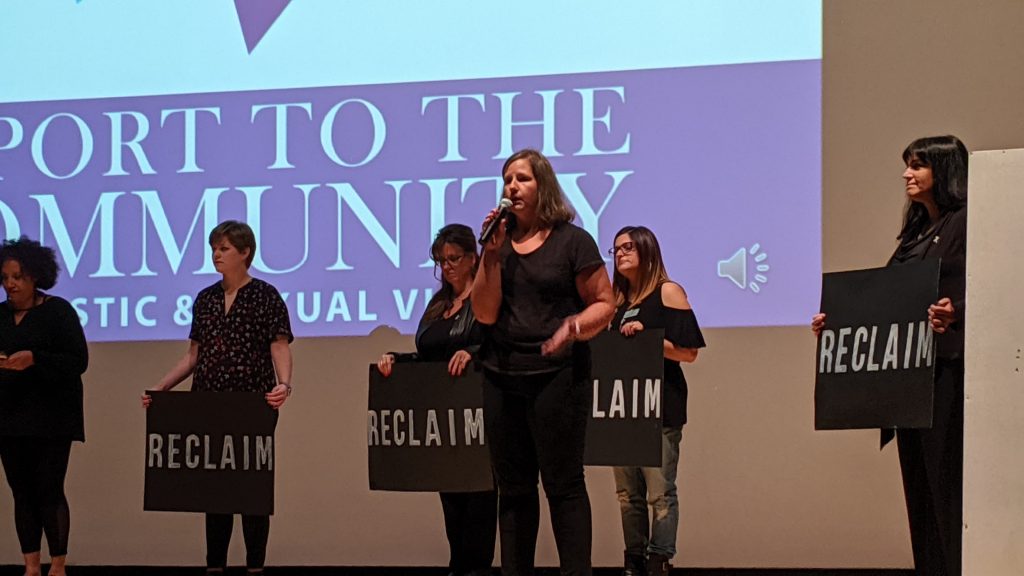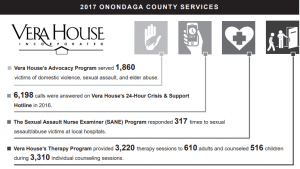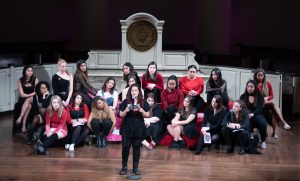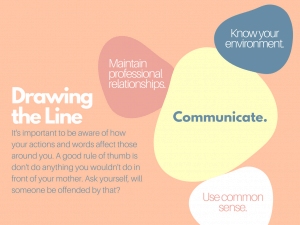Vera House makes case for continued efforts to curtail abuse
Vera House presents annual Domestic and Sexual Violence Report

While Vera House saw a considerable percent drop in the number of domestic and sexual violence victims it needed to help, the Syracuse organization’s leadership said efforts are still needed to prevent abuse from ever starting.
“Our early support work was focused on response,” Vera House executive director Randi Bregman said. “But then we quickly learned, from marginalized populations, that we need to look at alternative ways to find transformative, restorative justice.”
Bregman announced the findings in Vera House’s 30th Annual Report on Domestic and Sexual Violence on Wednesday to a crowd of more than 100 people at the Everson Museum of Art.
According to the report, Vera House served 1,562 victims of domestic and sexual violence in 2018 through their Advocacy program, a drop from 1,860 — or 16% — in 2017.
Bregman opened her presentation, which coincided with the start of Domestic Violence Awareness Month in October, reflecting on how far the organization has come since its early days.
“About two and a half years after I first started [in 1989], we had our first report to the community,” Bregman said. “A lot of numbers and data, and talk. I’m glad that other people are sharing the message we do, not just at Vera House, but as a community.”
Other members of Vera House took the stage to tell the audience about their contributions. Bryn Lovejoy-Grinnell, the organization’s director of legal service, presented on legal options available to victims of abuse. Lovejoy-Grinnell said that Vera House’s legal team was partnered with legal advocates all over Onondaga County, including the Volunteer Lawyers Project of Onondaga County, Inc.
Vera House’s men’s outreach coordinator, George Kilpatrick, spoke on the “12 Men Model” that Vera House and other support organizations were using to help educate men on how they can play a part in helping survivors and themselves. According to Kilpatrick, the program helped 85 percent of men “feel more equipped to intervene with sexual and domestic violence.” Kilpatrick brought Vincent Love, an alumnus of the 12 Men Model and a member of 100 Black Men of Syracuse, to speak about his experience in the program.
“I didn’t see myself as the type of guy that needed the training,” Love said. “I had never committed an act of violence, never committed any abuse. But it wasn’t until we were through the process that I began taking a look at how I was raised and the messages around masculinity.”
Members of minority communities also spoke on how abuse affected them and their families. Rebecca Fuentes of the Workers’ Center of Central New York and Dolores Bustamante of the National Alliance of Farmworker Women gave speeches in Spanish about how Latinx people and fieldworkers were directly affected by abuse.
Rahzie Seals of BlackCuse Pride spoke on how LGBTQ+ victims of abuse were denied certain basic privileges that straight and cisgender victims were able to take advantage of, such as the ability to work with authorities. Seals was joined by her BlackCuse Pride co-director LoriKim Alexander through a video speech. Alexander asked audience members to consider the higher rates of abuse among LGBTQ+ couples.
“More than half of indigenous and black trans women across the United States reported that they have been sexually assaulted in their lifetime,” Alexander. “Reporting and prosecuting hate crimes as hate crimes is part of the process of creating a truly just justice system. Believe us, and give us what we need.”
The speeches at the event were interspersed with performances of spoken word, song and dance. Vera House’s Survivor’s Network officials Angela Douglas, Alex Dukat and Jolie Moran opened the ceremony with the song “RECLAIM.” Actress Ay-yhaun-nah Vihlen gave a spoken-word performance titled “The Victim,” and poet Andre Douglas read “Spoken Word,” which had audience members snapping along to every stanza. Karina Anderson read an essay titled “A Short Essay on Surviving,” commenting on the privileges of the “survivor-adjacent,” and Dr. Juhanna Rogers concluded the event with a dance performance to the song “I’m Here.”
Following the event, Vera House’s Survivor’s Network encouraged audience members to fill out forms that committed them to the cause of helping survivors of all forms of abuse.








